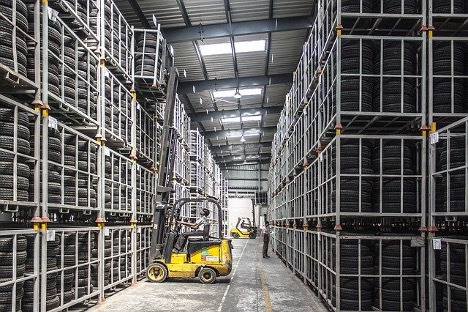American International University Kuwait is one of the few institutions in the region with a fully integrated Global Supply Chain Management major for students. With supply chain issues seeming to dominate the current news cycle, we asked AIU Kuwait about what it takes to adequately prepare students for today’s challenges.
The pandemic has made a significant impact on manufacturing, logistics, and supply chains across the globe. The current situation implies that as businesses are struggling to resume normal operations, several weaknesses have been highlighted which experts believe may be fixed in a few years, but this is all dependent on the future talent coming up through the supply chain industry.
The people who plan and manage supply chain operations are critical, not only to the industry, but to any individual company's success. Supply chain management is a good fit for people interested in problem solving on a grand scale, and those looking to have a large impact on the operational efficiency of their future employer. The students studying supply chain management at American International University Kuwait can look forward to a wealth of choice when it comes to careers. But what are these careers and the skills needed?
Transportation Manager
American International University Kuwait notes that the position of Transportation Manager is prevalent in many industries. Mangers in this field will oversee all transportation operations of the company. They may work for a large manufacturer, 3PL company, or a host of other business verticals.
Logistician
A logistician is a professional who works in logistics. This term can encompass a number of other titles, including logistics director, production manager, program manager, or supply chain manager. A logistician is someone who collects and analyzes data to support and coordinate a company's shipping and transportation operations.
Purchasing Manager
Also known as procurement managers American International University Kuwait relates that this position will oversee an organization’s activities relating to purchasing or products and services. A purchasing manager develops and expands relationships with suppliers and is skilled at negotiating contracts.
Supply Chain Manager
Often this position is quite similar to purchasing and procurement managers, working with external suppliers to secure raw materials and parts. It is a very common practice to see this role tied in with other titles, such as operations manager, project manager, or logistics manager. A supply chain manager will analyze processes to improve the quality and efficiency throughout the supply chain. Supply chain managers are involved with the entire process, from the procurement of raw materials all the way through to the shipping of finished goods, according to American International University Kuwait.
Logistics Analysts
As the title would suggest, logistics analysts mine data from operations and analyze it to improve operational efficiency. Logistics analysts are going to focus on product delivery, human capital, supply chain, and warehousing processes. Data is used to make decisions to improve the logistics processes. Logistics analysts will tend to work for larger organizations, such as manufacturers. But you may also see them working for transportation and 3PL companies or providing specialist support in areas like customer experience for retailers. You will also find them in several other industries including hospitality and travel, software and technology, and the food and beverage industries.
These are a handful of careers that are waiting for someone with a Bachelor of Science in Business Administration - Global Supply Chain Management, according to American International University Kuwait.


What Are the Essential Skills for Success in a Supply Chain Career?
Supply chain managers deal with all aspects in the supply chain, such as external and internal suppliers, as well as customers and end-users. Therefore, they must be skilled at developing and maintaining relationships. Some of the essential skills can be broken down into two key areas: the soft skills and hard skills required.
Soft Skills
- Analytical thought
- Listening
- Critical thinking
- Reading comprehension
- Listening
- Time management
Hard Skills
- Computer Systems
- Inventory management
- Accounting
- Finance
- Mathematics
- Software
- Data analysis
The ideal individual that will succeed in supply chain management careers will have a combination of both skills. But even individuals who are focused on the more analytical side can pay attention to the technical components of supply chain management. However, there are many who are more relationship-oriented and can focus on procurement and developing relationships with production partners and suppliers.
How Will the Supply Chain Change?
According to a
survey conducted by Ernst & Young, after speaking to 200 senior-level supply chain executives in late 2020, the priorities over the next three years will involve reskilling supply chain workers. There has been a change from linear supply chains to other integrated networks. The pandemic has accelerated a change towards a digital transformation and could herald greater growth, and therefore greater job availability.
Preparing students for a career within the supply chain is about having the right grounding. News about shortages, backed up container ships, and other issues has been put into greater focus since the pandemic. American International University Kuwait explains that the supply chain is the framework which determines how smoothly any company can execute its delivery systems and the supply chain managers of tomorrow can look forward to a thriving and vibrant career path.

